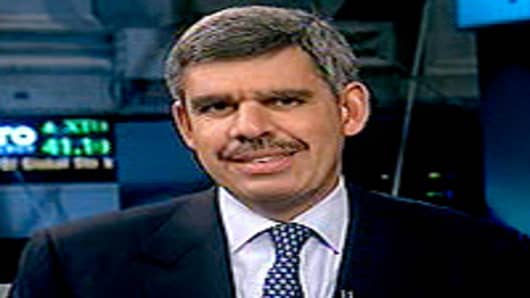Investors are dissatisfied with earnings because companies are showing strong bottom lines but not enough growth in revenue, Pimco's Mohamed El-Erian told CNBC.
The lack of top-line gains is stoking fears that the economy still is not back on its feet and may not get there for an extended period, said El-Erian, CEO of the world's largest bond fund.
"The market is giving you a very clear signal. It's saying, 'Let's focus on top-line revenue. It's not enough to focus on on the bottom line, because we don't want to see one-off cost containment, we don't want to see one-off items being shifted," he said. "We want to see top-line revenue growth because we want to see sustainable earnings, and the companies are falling short...of the top-line revenue growth that was anticipated."
El-Erian spoke as Wall Street girded for a rough day on the heels of disappointing earnings reportsfrom bellwether companies including Johnson & Johnsonand Goldman Sachs.
Both companies posted results that on their face beat analyst expectations but fell short of revenue expectations.
"The market has to reprice to this reality that for a while revenue growth is going to be muted until we finish this deleveraging process," El-Erian said.
The cycle of deleveraging—or shedding the mountains of debt accumulated both by companies and consumers—feeds into the "new normal" period of slow economic growth that Pimco has been forecasting for months.
"We hope things will pick up, and they will pick up at some point when we get the excesses of many of years of debt and credit entitlement, when we get that out of the system things will start growing again," El-Erian said. "But we have to go through a period of deleveraging."
The cycle probably will take a few years to play out, he added, and will exact some pain in the process.
"I think the market re-prices," he said. "The hope that the policy makers can do something is low. We can't look to the Fedto do amazing things. Interest rates are at zero—the most the Fed can do is signal they are going to stay there for a long time, or they can resume buying assets. But that has a lot of collateral damage and unintended consequences."
He said lawmakers in Washington have been slow to attack the root causes of the slowdown, the most important of which is unemployment.
"We've done very little to deal with long-term unemployment," El-Erian said. "Money's becoming less and less effective because you can't fool all of the people all of the time."



